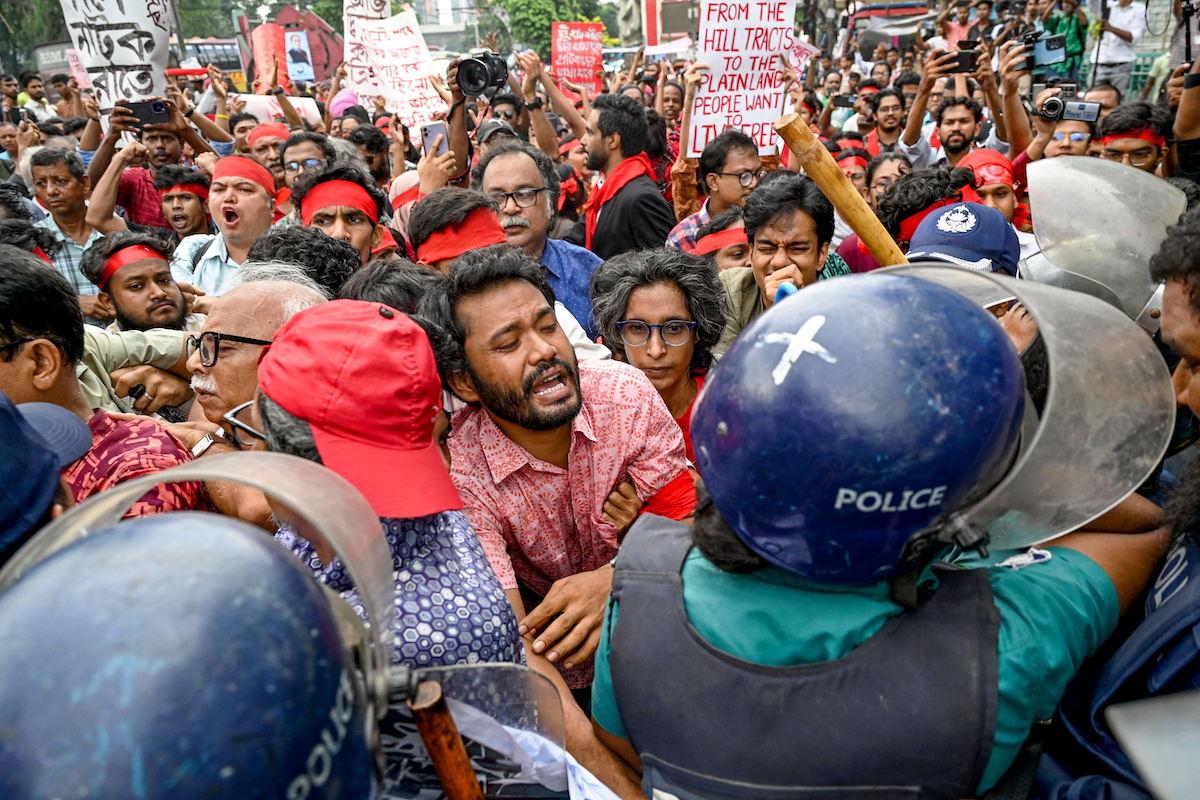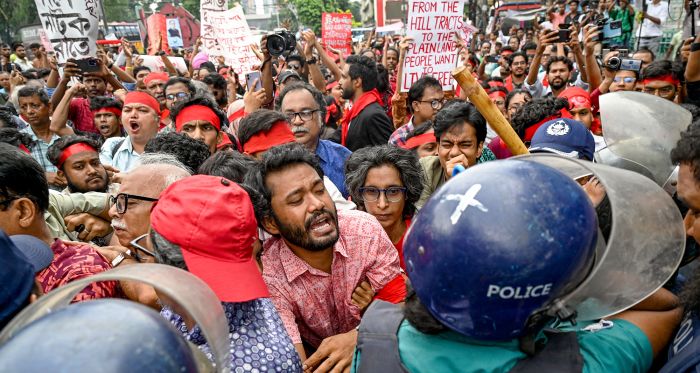For several weeks in July, Bangladesh was wracked by its most serious episode of civil unrest in decades. What began as student protests against a controversial job quota system escalated into a nationwide crisis that has tapped into a deeper vein of discontent about the state of the economy, official corruption, and Prime Minister Sheikh Hasina's heavy-handed crackdown. As of July 29, at least 150 people have died in the violence and 9,000 have been arrested.
The government’s response, which included a curfew and an internet blackout, has exposed a wider set of grievances and engendered another round of student demands, which the government seems completely disinclined to meet. There are now questions about the longer-term economic fallout of the unrest and whether political trust between the government and some segments of the population can be restored.
What triggered the protests?
The initial spark for the unrest was a High Court decision on a quota system for awarding government jobs. The system, created in 1972, the year after Bangladesh won its independence from Pakistan, allocated 30 per cent of government positions to the descendants of “freedom fighters,” or those who fought on the side of liberation. Prime Minister Hasina is personally tied to the quota system: her father, Sheikh Mujibur Rahman, was the country’s founding leader.
That system remained in place until 2018, when widespread protests prompted the courts to abolish it. But on June 5 of this year, the High Court reversed that decision, clearing the way for the system’s reinstatement. Opposition parties and other critics have argued that such quotas unfairly benefit the descendants of pro-government supporters and are aimed at fostering loyalty within the bureaucracy and perpetuating the power of the ruling Awami League. The discontent is fuelled by a broader perception that there are limited opportunities for merit-based public sector jobs and a belief that some Bangladeshis game the system by obtaining fraudulent freedom fighter credentials.

On July 21, perhaps in part to quell the growing unrest, Bangladesh’s Supreme Court ruled that only five per cent of government jobs should be allocated for freedom fighters’ descendants. The protesters, however, were not placated. On July 22, Students Against Discrimination, the student group behind the protests, announced a 48-hour suspension of their demonstrations (which it subsequently extended another 48 hours) to allow the government to meet a new set of demands. These included a personal apology by Hasina for the protesters’ deaths; the arrest or resignation of law enforcement agents or government or university officials implicated in the crackdown; and compensation for the victims and their families.
On July 30, after Hasina ignored the students’ ultimatum, the students re-started their protests against the "mass killings, arrests, attacks, and disappearances of students and people.”
How did the government respond?
Hasina has labelled the protesters "Razakar" — collaborators with the enemy during the independence war — and has refused to engage with the movement’s leaders. Her party, the ruling Awami League, views these protests as agitation led by the Bangladesh Nationalist Party (BNP), the main opposition party.
Although the recent demonstrations began non-violently, things escalated after protesters were attacked by the Bangladesh Chhatra League, the ruling party's student wing, with sticks and steel pipes. By July 18, the government had deployed police and paramilitary forces across Dhaka to shut down campuses and disperse the protests. The government gave police shoot-on-sight orders for anyone violating the curfew, and subsequently shut down the internet and mobile data services, only partially restoring them in Dhaka and Chittagong on July 24.
In the past, the Bangladeshi government has been accused of using similar internet shutdowns to suppress dissent, particularly during opposition-led protests. On July 30, the ruling Awami League-led coalition banned Jamaat-e-Islami, another opposition party, blaming it for inciting protests.
What are the broader frustrations fuelling these protests?
For years, Bangladesh’s economic story was a positive one. When it gained independence in 1971, Bangladesh was one of the world’s poorest countries. But around the year 2000, it began growing at an annual average rate of six per cent, reaching the important milestone of lower-middle income status in 2015. This growth has been primarily driven by the readymade garments industry, which employs 4.2 million workers.
Nevertheless, several underlying issues have fuelled economic anxiety and frustration, such as inequality, youth unemployment, and high inflation. As of 2023, 40 per cent of youth aged 15–29 were classified as ‘NEET’ (not in employment, education, or training), with estimates that about 18 million young people are out of work. Economic hardships have been compounded by rising food inflation, which has reached 10 per cent, and increases in other living expenses.
By mid-2023, more than 37 million of the country’s 172 million people faced moderate to severe food insecurity, and utility costs soared as the government raised electricity and gas prices three times within a single year. Reports of corruption among high-ranking officials and mismanagement have also eroded public trust, with the wealthiest 10 per cent of the population controlling 41 per cent of the nation’s income, while the bottom 10 per cent receive only 1.3 per cent.
What are the economic and foreign policy implications?
The ongoing unrest has exacerbated the economic strains bearing down on Bangladesh. Workers in the informal sector, which accounts for 85 per cent of the country’s workforce, are especially vulnerable to the effects of lockdowns and curfews. Additionally, lower-income and middle-class households have been severely impacted as prices of some essentials nearly doubled, increasing the financial strain on already struggling families.
The economic damage of the government’s response also extended beyond individual households. On July 22, Bangladesh’s business leaders urged Hasina to lift the curfew and restore internet services, which, according to the president of the Dhaka-based Foreign Investors’ Chamber of Commerce and Industry, has cost the Bangladeshi economy US$10 billion. Supply chain disruptions have reduced the availability of goods, leading to price hikes and increased inflationary pressures. The readymade garment sector, which accounts for more than 80 per cent of Bangladesh’s US$50 billion in export earnings, has been hit hard, and factories have remained closed since July 20, resulting in daily losses of nearly US$150 million. The internet blackout also severely impacted e-commerce and Facebook-based businesses, with daily revenue losses estimated at US$5 million.
The need to recover losses and repair damaged public infrastructure, combined with reduced export earnings, will put pressure on Bangladesh’s dwindling foreign exchange reserves. These economic pressures will complicate Hasina’s ongoing negotiations with the IMF and other countries for loans, especially given that S&P Global, an American financial analytics company, recently downgraded Bangladesh’s long-term sovereign rating from ‘BB-’ to ‘B+’ — indicating a high credit risk — due to the ongoing protests. On July 31, the EU, which is Bangladesh’s main trading partner, announced that it was delaying negotiations with Dhaka on a new economic pact that would have enhanced trade and other economic relations.
There have also been consequences for Bangladesh’s foreign relations. For years, Hasina has been accused of authoritarianism and human rights violations, which her government denies. In January, the Awami League won a fourth consecutive term, following a controversial election marred by a BNP boycott, violent protests, a crackdown on dissent, and low voter turnout. As a result, Hasina’s government came under heightened international scrutiny at the time by the U.S., U.K., the United Nations, and others.
In response to the recent violence, several nations, including Canada, Germany, and the U.S., have issued travel warnings for Bangladesh, and more than 4,500 Indians left due to safety concerns. Canada's Foreign Minister Mélanie Joly and Defence Minister Bill Blair took to X to express concern about the violence, urging peace, condemning the attacks on protesters, and stressing the need for democratic freedoms and the rule of law.
Possible longer-term consequences
The recent crackdown could provoke a wider backlash against the government, spur an exodus of educated Bangladeshis, and loosen Hasina’s grip on power as trust between the state and citizens erodes.
While student protests have focused on the Awami League’s favouritism towards war veterans' families, broader public discontent stems from the stifling political climate, a weakening economy, and the government's failure to address critical issues such as job scarcity and inflation. In recent months, there has been a surge in Bangladeshis seeking asylum in Canada, with projections of more than 5,000 asylum claims in Quebec alone and 22,000 in Canada as a whole by the end of 2024.
The crisis in Bangladesh will place Western nations in an awkward position. But despite their concerns about human rights violations and democratic backsliding, Bangladesh's geopolitical importance and economic potential mean that Canada and other Western governments will likely take a cautious approach in their criticisms, balancing advocacy while maintaining crucial diplomatic and economic ties with a key South Asian partner.
• Edited by Erin Williams, Senior Program Manager; Vina Nadjibulla, Vice-President Research & Strategy; Ted Fraser, Senior Editor.



